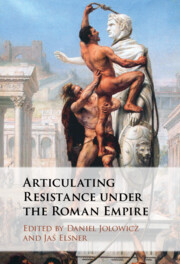Book contents
- Articulating Resistance under the Roman Empire
- Articulating Resistance under the Roman Empire
- Copyright page
- Contents
- Contributors
- Acknowledgements
- Abbreviations
- Introduction Articulating Resistance
- Part I Language and Identity
- Part II Genres of Literary Resistance
- Chapter 2 Courtroom Rhetoric in Imperial and Late Antique Philosophical Dialogues
- Chapter 3 Greek Declamation and the Art of Resistance
- Chapter 4 Plutarch’s Parallelism and Resistance
- Chapter 5 A Glitch in the Matrix
- Part III Identity Negotiation
- Part IV Religion and Resistance
- References
- Index
Chapter 5 - A Glitch in the Matrix
Aphrodisias, Rome and Imperial Greek Fiction
from Part II - Genres of Literary Resistance
Published online by Cambridge University Press: 23 December 2022
- Articulating Resistance under the Roman Empire
- Articulating Resistance under the Roman Empire
- Copyright page
- Contents
- Contributors
- Acknowledgements
- Abbreviations
- Introduction Articulating Resistance
- Part I Language and Identity
- Part II Genres of Literary Resistance
- Chapter 2 Courtroom Rhetoric in Imperial and Late Antique Philosophical Dialogues
- Chapter 3 Greek Declamation and the Art of Resistance
- Chapter 4 Plutarch’s Parallelism and Resistance
- Chapter 5 A Glitch in the Matrix
- Part III Identity Negotiation
- Part IV Religion and Resistance
- References
- Index
Summary
This chapter argues that Chariton’s Chaereas and Callirhoe is exceptional among the extant novels for its ideological entanglement with Rome, a status in no small part a result of the author’s opening proclamation to be from the city of Aphrodisias in Asia Minor, a ciuitas libera and perennially loyal pet of the Roman emperors. The first section of this chapter suggests that the novel’s fictional status affords it a degree of licence to ‘speak truth to power’, evidence of which can often be found in details that do not quite make sense (‘glitches in the matrix’). The second section mobilises a range of theoretical models from resistance studies to argue that one such detail, the presence of ‘Phrygian pirates’, represents a sideswipe at Roman military and imperial pretensions. The third section presses the interpretative potential of Chariton’s claim to be from Aphrodisias and argues that, although a strongly local text, it is irredeemably enmeshed in the politics of the Mediterranean world. The fourth section explores how the public use of Phrygian iconography in Aphrodisias as a strategy of ‘kinship diplomacy’ with Rome contrasts with the negative connotations of ‘Phrygian’ in Chariton’s novel, which indicates that even a city as openly pro-Roman as Aphrodisias was capable of expressing dissent.
Keywords
Information
- Type
- Chapter
- Information
- Articulating Resistance under the Roman Empire , pp. 112 - 136Publisher: Cambridge University PressPrint publication year: 2023
